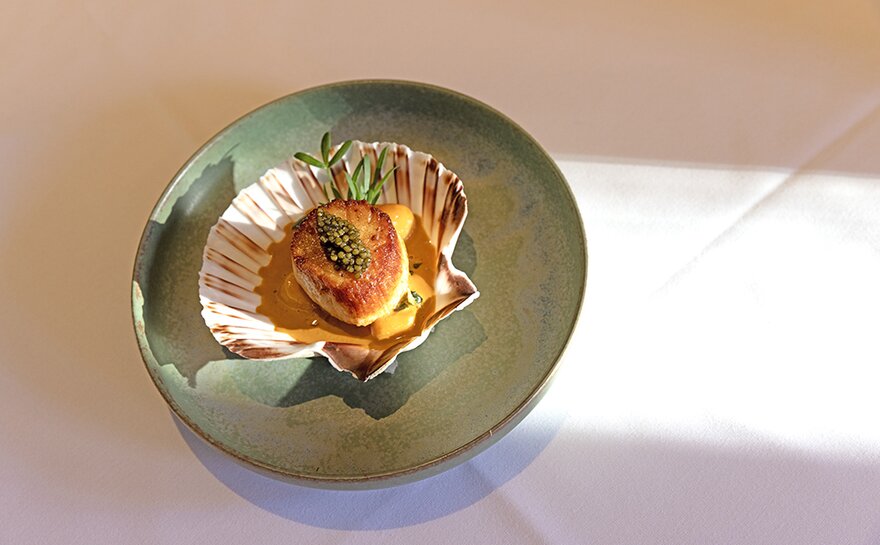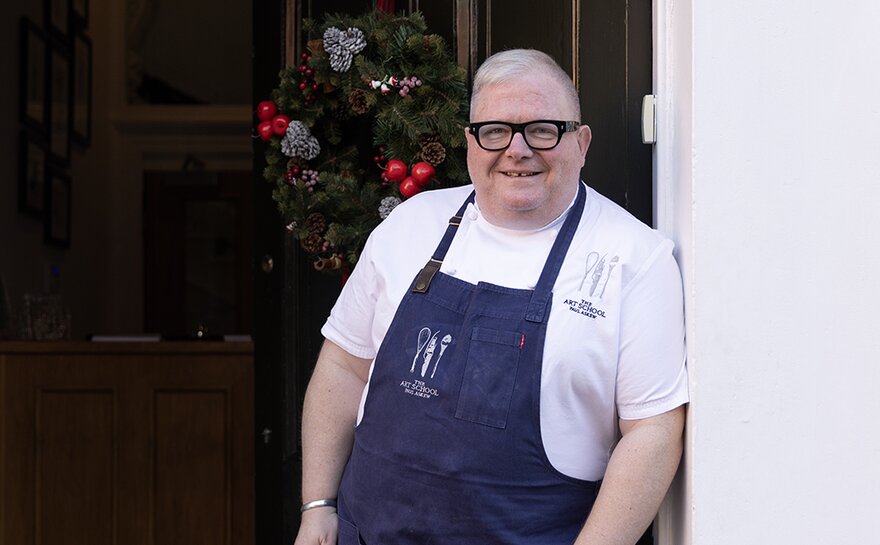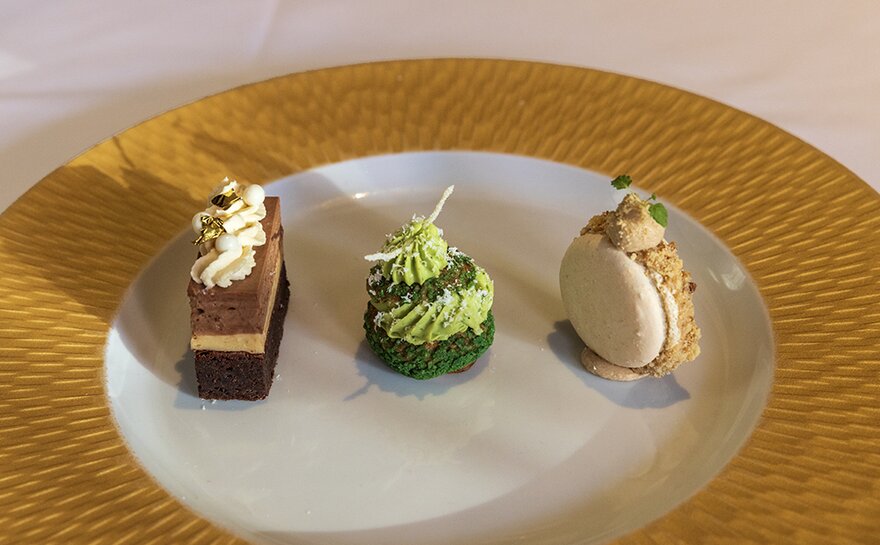Flying pigs are made possible in Paul Askew's vision at Art School in Liverpool. The chef talks about celebrating the city and going onwards and upwards
The phrase ‘pigs might fly' represents disbelief to most people, but not to Paul Askew. To him it embodies the endeavour and self-belief required to reach for your goals. The chef has just unveiled ‘Le Cochon Volant', a sculpture of a flying pig, to celebrate the 10th anniversary of his Art School restaurant in Liverpool, and the bronze is a statement about all he has overcome to reach this point.
Askew opened the Art School in 2014, determined to promote both the artisan skills of chefs as well as the city of Liverpool as a hospitality destination. The site is set in the Victorian 1888 ‘Home for Destitute Children' building and was more recently the art faculty of Liverpool John Moore's University. Now, guests enjoy creative gastronomy in what was the life drawing and sculpture room.
Fittingly, given his support of local talent, Askew commissioned celebrated local sculptor Emma Rodgers to create the flying pig, which now takes pride of place in the restaurant's private dining room.
"My nickname is Porky Askew on X/Twitter, for obvious reasons, and onwards and upwards has always been my mantra," Askew explains. "No matter what happens, you dust yourself down and keep going. So the flying pig embodies that whole spirit of ‘pigs might fly', but for us it means ‘we can do this'."
Liverpool on the rise
That spirit of optimism has extended to Askew's promotion of Liverpool as a region too, along with his support and encouragement of local chefs and restaurateurs. As co-chairman of the Liverpool Hospitality Association and Liverpool City Region visitor economy board member, he has become a spokesperson for the city and the go-to point of contact for everything hospitality in the area.
"When I came back from New York in 1995 there were around 70 restaurants in Liverpool and now there are closer to 2,000," he explains. "And I do feel a responsibility as a lot of the chefs have been through kitchens with me, either at the Philharmonic Hall, the London Carriage Works or Hope Street hotel, which has just turned 20."
In New York Askew worked for the Herberts Group of restaurants, which owned an extensive outside catering business. The experience taught him the adaptability required to lead the brigade at the newly opened Philharmonic Hall in Liverpool in 1995, catering for covers that swung from 12 to 500. He moved on to develop the London Carriage Works restaurant and Hope Street hotel as director in 2002, before selling his stake in the business to open the Art School.
Despite Askew being embedded into the Liverpool hospitality scene, finding the right calibre of staff proved tricky. "When we opened I took seven apprentices on – and that was a full-time job on its own. But when you think back to 2013, where were the pastry chefs, junior sous or sommeliers coming from? We've always had the policy of training our own."
The business opened as a 48-cover restaurant with 25 staff and has since expanded to include a Champagne cellar bar with afternoon tea service and a private wine tasting space, employing 43 people. A recent refurbishment has also added a new private hire space, the Moriarty Room, named in tribute to Askew's late mother, with whom he shared a love of Sherlock Holmes.
"Here it's about developing the food culture and proving a point to the capital that we can hit their standards," Askew says.
"I think there's always been a bit of postcode snobbery about Liverpool."
It's certainly a bugbear of Askew's that Liverpool's dining scene doesn't get the credit it deserves. Though he harbours aspirations of Michelin recognition, he says it's more about putting the city on the culinary map than individual awards.
"It's not about the status of having a Michelin-starred restaurant as such, or having a trinket on the wall, but because it's a big statement for a city to say we have this status," Askew says. "It will bring investment and other food operators, and that's how you create a healthy dining scene."
Sadly, the city's restaurant scene has taken a hit in recent months, with the closures of Bouchon, which cited "inflation and the robber barons at the utility companies" for its demise, along with Dave Critchley's Lu Ban, who also blamed rising costs. Meanwhile, Liam and Ellis Barrie closed their restaurant Lerpwl, in the Royal Albert Docks, earlier this year too, after the landlord pulled the plug on debts accrued during the pandemic.
All closures hurt hospitality in the city and are keenly felt by Askew. "It's such a sad moment when people close as we'd worked so hard to develop that quality of choice," he says. "There are still a cluster of ambitious restaurants here, but it's sad to lose anything that contributes to our diverse, healthy dining scene. If we can be the trailblazers and lift that standard, then it will bring everything up. And doing it in a supportive way for the city and not just us."
He does so by both championing the city and setting the example to fellow chefs, maintaining artisan skills by continuing to make everything served in the restaurant, from the bread to the chocolates, despite that dedication to craft putting pressure on the business.
"Were we tempted to wave the white flag at times? I'm the eternal optimist, but I'd be lying if I said I hadn't been. But that's why I've tried to be at the forefront of championing the needs of the sector. This sector was being battered before Covid and we've needed recalibration for decades. We used to be criticised for the way we work with long hours, but now we've reset, the industry needs breathing space to recalibrate."
The irony, Askew believes, is that the government is investing in skills and education, but at the same time the hospitality industry is being forced to de-skill in the interests of cost efficiency.
"Right now the input costs on hospitality push everything towards central production because it's the only way businesses can make money," he says. "It pushes everything away from an artisan kitchen, so the skills get stripped away. When ministers talk about apprenticeship programmes there has to be joined-up thinking, as when chefs come out of education there are few restaurants practicing what they have been taught. Those skills are just lost.
"When you're a chef-owner, you want to make the bread, the butter, the sauce and even the chocolate, and I'm really proud of keeping it that way for 10 years in a city like Liverpool. But it's mainly because I'm a stubborn front-row rugby player. This is the longest scrummage of my life, but we're going to get there. That's the spirit you need."
Euro-vision
Askew certainly plays as though it's a team game, mentoring those both in his brigade and chefs running their own sites in Liverpool. He has also widened his network to play a part in some of the most significant events hosted in the region: he cooked lunch at the Museum of Liverpool and dinner at the Beatles Story at the Albert Dock for the G7's foreign and development ministers in December 2021, has recreated the Art School at the Grand National in Aintree in April 2022 and 2023, cooked at the Turner Prize in December 2022 and for 1,000 guests during Eurovision in May, and is the patron of the Taste Liverpool Drink Bordeaux festival.
"Business growth has come from unpredictable avenues," he confirms. "There's a pivotal moment coming for Liverpool in that we've got a deal with Bordeaux through an entity called Taste Liverpool – we want to try and create something great for the city. So for example, Eurovision comes to town and Taste Liverpool wraps around that event and shows off all the food and drink in Liverpool and the hospitality of the city. We want to do that for business tourism and the likes of Visit Britain."
Where does he find the time for all of this work outside of the day job? "I suppose I'm slightly unhinged and obsessed like many people in this industry," Askew admits. "To do this job well means making it a way of life. Even when I'm not here I try and do things where I'm putting back into the industry. Whether it's working on local initiatives or with the Royal Academy of Culinary Arts on the likes of Chefs Adopt a School."
He cites fellow industry stalwarts the Rouxs as culinary heroes, along with former Le Gavroche head chef Steven Doherty, so it's fitting that when we meet he is looking forward to a final lunch at the culinary institution that is closing after 56 years.
"I always said I wanted to be the Le Gavroche of the north and now I'm going to say farewell to it," Askew laments. "That's heartbreaking for me and the industry. It was our institution that we held up as an exemplar."
Askew might only be a decade into the journey with the Art School, but there is no doubt he's well on the way to securing his own iconic legacy in Liverpool. If anyone can help the hospitality sector in the city fly, he can.
The founder members' club
As part of the 10th anniversary celebrations, Askew has launched a founder members' club, which offers his regulars an annual membership offering access to exclusive events and discounts at the restaurant.
Membership starts at £1,950 a year going up to £3,250 for the Grand National package.
All members are given their own drawer, which sits at the entrance of the restaurant and will contain gifts on each visit, along with benefits including a 10% discount for the life of the membership, a tasting meal for two with wine, first refusal on events, use of the private dining room and VIP bookings for external Art School events.
"This is part of our 10-year celebration and it helps to diversify," Askew explains. "We have built up a wonderful clientele and so we're saying instead of joining a golf club, join a food and wine society. You get retail delivered to your door, including wines you can't get unless you're in the industry, discounts at all of our brands and first refusal on any of our events. Anything we do goes to the founder members first. People like the exclusivity.
"We've tried to be creative and it's been embraced by our clientele. We wouldn't have been able to do it until we had all these assets, such as [new restaurant] Barnacle as well as the Arts Club, but now we have something tangible that's also good value. We're up to 40 members already."
Captain Barnacle Bill Askew
In 2021 Askew and his son Harry, who is media and marketing assistant for the wider business, partnered with chefs Kieran Gill and Jake Lewis to open Barnacle in Liverpool's Duke Street Market.
It has been named in homage to Askew's father, who was a merchant navy sea captain for Blue Star Line and was known as ‘Captain Barnacle Bill Askew'. The concept has been inspired by Liverpool's maritime history and global connections and is designed to be "more accessible" than the Art School, geared towards a younger demographic.
"The restaurant is based on a different model, as rent is a percentage of turnover," Askew explains. "I think it's clever and could be the way that hospitality recovers since people don't want to sign huge leases now. You have to be creative and find ways for businesses to grow."
The aim is to "fly the flag of the region" by using producers from within a 25-mile radius, such as Ward's Fish of Birkenhead, Edge & Son Butchers, From Field to Fork farm butter and Wirral Watercress.
"We're using our ingredients and our people but using international methods and recipes. It's an old shipping warehouse so it felt right. we use all the same suppliers as the Art School but with a short, accessible menu.
"It's exciting for me because it's a bit of an homage to my dad, who in taking me halfway around the world and back got me into food in the first place, but also to show off the amazing, world-class ingredients we have in the Liverpool city region. I wanted to appeal to Scousers and locals as well as people coming into the city for staycations and tourists."
Continue reading
You need to be a premium member to view this. Subscribe from just 99p per week.
Already subscribed? Log In












